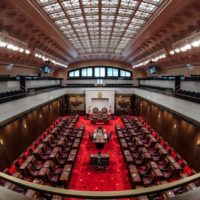News
11 key Government bills become law
The Senate made significant progress on key Government legislation this week, with 11 bills receiving Royal Assent, one moving to the House of Commons for consideration and another advancing to a Senate committee for further study.
“Senators examined – and ultimately adopted – important pieces of legislation ranging from making life more affordable to Canadians to advancing reconciliation,” said Senator Marc Gold, the Government Representative in the Senate.
“The Senate also strengthened some pieces of legislation with amendments, including legislation to support Canadian journalism and to update the complaints process for federally appointed judges.”
The following pieces of legislation were proclaimed into law after being adopted in the Senate:
Bill S-8 bans sanctioned foreign nationals from Canada. It notably ensures that Russian individuals and entities who have been sanctioned in response to Russia’s invasion of Ukraine are inadmissible to Canada.
Bill C-9 replaces the process through which the conduct of federally appointed judges is reviewed by the Canadian Judicial Council. It establishes a new process for reviewing allegations of misconduct in cases that do not warrant a judge’s removal from office.
Bill C-13 – the most substantive update to the Official Languages Act in more than 50 years – recognizes that the French language requires a targeted approach in order to foster substantive equality, all while continuing to protect the rights of linguistic minorities.
Bill C-18 supports Canadian journalism by creating a framework for digital platforms to enter into voluntary commercial agreements with the news organizations whose content is posted on their sites.
Bill C-22 establishes the Canada disability benefit to reduce poverty and to support the financial security of working-age persons with disabilities.
Bill C-41 facilitates humanitarian aid, as well as immigration activities and other government operations, in Afghanistan and other geographic areas controlled by terrorist groups.
Bill C-45 advances economic reconciliation by providing First Nations with new tools and resources to pursue their long-term economic objectives.
Bill C-47 implements provisions of the budget, notably providing a legislative framework to help make life more affordable for low- and middle-income Canadians and building a clean economy that will create sustainable jobs across the country.
Bill C-51 gives effect to the self-government treaty recognizing the Whitecap Dakota Nation / Wapaha Ska Dakota Oyate, reaffirming an inherent right to self-governance.
Bill C-54 grants funds towards defraying charges and expenses of the federal public administration in the fiscal year ending on March 31, 2024.
Bill C-55 grants funds towards defraying charges and expenses of the federal public administration in the fiscal year ending on March 31, 2024.
Government legislation advances
In addition to the new laws, the Senate adopted Bill S-12, which proposes to change the law relating to the National Sex Offender Registry, and to make the criminal justice system more responsive to the needs of victims. It now advances to the House of Commons for review.
Bill C-21, which aims to address firearms violence in Canada and implement preventative measures, was adopted at second reading and referred to the Senate Committee on National Security, Defence and Veterans Affairs for consideration.




















































